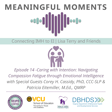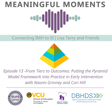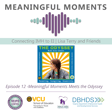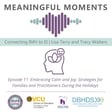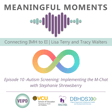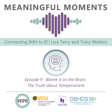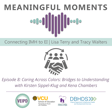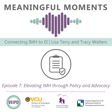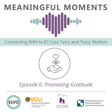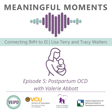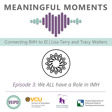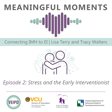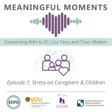Introduction to Infant Mental Health Podcast
00:00:10
Speaker
Welcome everyone to Episode 4, Breaking Down the Stigma of Infant Mental Health. My name is Lisa Terry. I am an Early Intervention Professional Development Consultant with Virginia's Early Intervention Professional Development Center at VCU with the Partnership for People with Disabilities.
00:00:32
Speaker
I am also endorsed as an infant mental health mentor, and I love all things infant mental health. And so me and my colleague Tracy, who's going to introduce herself, who's super excited also about infant mental health, decided to start this podcast and really just dig a little bit deeper into all the topics related to infant mental health. So we're glad you're joining us today. And Tracy, if you want to go ahead and introduce yourself.
00:00:58
Speaker
Yeah, so good to be with you guys. Thank you, Lisa. As Lisa said, my name is Tracy Walters. I'm the state coordinator for Infant and Early Childhood Mental Health, and I'm seated at the Department of Behavioral Health and Developmental Services and the Office of Child and Family Services. Really happy to be with you guys, Lisa, and I really love to mull over these topics with you guys. And so today we have another great one for you, and I'm happy to be here with my partner in crime, Lisa. What are we going to be talking about?
00:01:28
Speaker
Yes, before we get to that, let me just let everyone know first for our sponsor message.
Breaking Stigmas Around Infant Mental Health
00:01:33
Speaker
This podcast is a collaborative effort from the Virginia Department of Behavioral Health and Developmental Services. That's through a contract with the Partnership for People with Disabilities at Virginia Commonwealth University. And yeah, so let's get to our topic.
00:01:48
Speaker
So we are really going to start focusing on the stigma of infant mental health. We've heard all about it. Everyone says, as soon as they hear infant mental health, it's kind of this negative tone that's related to it, right? And so we want to really break down the different definitions. We'll talk about the barriers and provide you with a few stats and what your call to action might be, right? So that's what's in store for today.
Understanding Infant and Early Childhood Mental Health
00:02:13
Speaker
So first, I really want to talk about what is the difference
00:02:17
Speaker
between infant and early childhood mental health versus early relational health. So infant and childhood mental health, that's going to really focus on the prevention, the promotion, and then the treatment of children birth to five to really support their overall social emotional wellbeing.
00:02:37
Speaker
Now, zero to three, they came up with a definition that I really feel like captivates it very well. So their definition is the developing capacity of a child from birth to five years old to form close and secure adult and peer relationships, experience, manage, and express a full range of emotions.
00:02:59
Speaker
They're going to explore the environment and learn. And that's all in the context of family, community, and culture. Through relationships with parents and other caregivers, infants and toddlers are going to learn what people expect of them and what they can expect of other people. So nurturing, protective, stable, consistent relationships are essential to young children's mental health. So that is really how zero to three defines
00:03:25
Speaker
infant and early childhood mental health.
The Role of Early Relational Health
00:03:28
Speaker
But I also want to talk about early relational health because that might be a concept that a lot of people may have not heard about, but it really resonates well with pediatricians and policymakers. So early relational health, it kind of expands the focus
00:03:43
Speaker
on early relationships between the caregiver and the child. So the definition for that is early relational health is the state of emotional wellbeing that grows from the positive emotional connection between babies and toddlers and their parents and caregivers. When they experience strong, positive and nurturing relationships with each other, it's really critical
00:04:10
Speaker
to creating healthy children, healthy families, and healthy communities. And that definition is brought from the Center for Study of Social Policy, who actually has this huge early relational health campaign where you can find so many different resources for that.
Professionals in Infant Mental Health
00:04:25
Speaker
Yeah, Lisa, that is a great resource, and we will make sure that everybody gets that link so that they can kind of dive into that and be more familiar. It's also really interesting when you look at these two definitions. You know, when you think of that IECMH,
00:04:41
Speaker
umbrella, you know, this is where you're going to see a lot of different practitioners push into that world, right? So you're going to be looking at your AI professionals, your infant mental health professionals, your pediatricians, there's going to be social workers, so many different people will touch that, that piece of work since you're looking at that prevention and promotion.
00:05:00
Speaker
and the treatment. And then with that early relational health, which I think is still kind of evolving, I think that messaging is still evolving, what's really interesting is back when a lot of that work started to be present, it was kind of put out there also to reduce stigma.
00:05:20
Speaker
And so I think it's so interesting that it's folding into this conversation today because it was easier to wrap our minds around early relational health. It's a little softer to the ear than that infant and early childhood mental health verbiage that kind of gets put into our environment quite a bit. So I just think it's interesting from a stigma standpoint, how we're even looking at the messaging, which will come up in the conversation and language.
00:05:49
Speaker
for our community. Yeah, Tracy, you're absolutely right. And it's kind of cool, though, how early relational health really does really have that focus on those early relationships. Because I think we can all agree how important those relationships are, right? It's going to impact the child's development, their opportunities to learn, right? It's going to impact how they're expressing their emotions, too, if we go back to the definition from zero to three, right? And how they're expressing the range of emotions.
00:06:19
Speaker
And so I think that we can all agree that those relationships are really the foundation for learning for children. Those are the foundation for setting up their future outcomes. And that's why it's so important. I think that's why early relational health just really resonates well. Yeah. And I think when we're really honing in on that early relational health piece, it really helps us lean into what we already know about attachment, right? And healthy attachment and helping build that healthy attachment between
00:06:47
Speaker
parent and child. And for any of you guys who are familiar with Dr. Gordon Neufeld, he has a lot of, he has a website, it's the Neufeld Institute, but he talks a lot about the importance of that attachment in that early relational health
00:07:05
Speaker
And one of the things that he really refers to is the irreducible needs of children. And that was a book at some point. Some of us have read that. Some of us have been around that. If not, it's a great piece of literature to look up, but he relates it to healthy attachment. And one of his, one of the things he says that I love is that it really allows the child to rest from the work of earning his right to be who he is and
00:07:33
Speaker
as he is. And so we want that soft place for that child to fall so that that attachment is so steady for the child and the parent that it's this comfortable place to build this early relational health. So that just as you're saying, Lisa, those outcomes, the trajectory of that child's life and for that parent-child relationship is going to be very strong and healthy.
00:08:00
Speaker
Right, Tracy, because that attachment piece, for those that aren't really familiar with the word, when we're talking about secure attachments, really what we want is consistency. Consistency is key, and we wanna make sure that these children are receiving responsive care throughout their early years, right? And so when they're crying, the parent's gonna go and attend to them and pick them up and they're going to understand what it is that they want and what their needs are, right? And so there's that attunement as well.
00:08:30
Speaker
Yeah, I think you're right, Lisa. And I think it is about that expectation, right? I cry, you come, right? I'm the baby. I'm crying for mommy, mommy comes. And it's this routine that we can expect. I know what to expect of you when I have a need that needs to be met. And I think that that's how the brain is built. That's how our emotional states are regulated. And so just having that reciprocal relationship, that attunement that you're speaking of is so critical in that child-parent
00:09:00
Speaker
or child caregiver relationship. Right. And so we know that infant mental health is essential, right? And it really touches everything. We've talked about this before in earlier episodes. It really touches all parts of development. And so we have to really understand how we all play a role. And that was in episode three, right? How we all play a role in this and what we can
Signs of Emotional Disturbance in Infants
00:09:23
Speaker
do. But Tracy, I want you to go ahead and break down the statistics for us.
00:09:27
Speaker
Yeah yeah let's take a look at that because i think that's something that you know probably as practitioners we don't get to spend a lot of time really looking at. And thinking about so if we're looking at what you know what we're learning.
00:09:41
Speaker
If we go to zero to three, which is a wonderful resource, some of the statistics they've shared is that in relation to infant mental health is that they're highlighting the importance, and I think it was Bronner and Stevens, and they estimate that 9.5% to 14.2% of children birth to five years old experience emotional or behavioral disturbance.
00:10:09
Speaker
So just let that sink in when you're thinking about the children that you're working with each day. How does that come across to you, Lisa? Yeah, well, I think it's really important too. Let's break down when we're talking about emotional or behavioral disturbance, like what does that mean? Let's break that down a little bit more for people.
00:10:28
Speaker
Yeah, right. So if we're looking at behavioral disturbances, one of the things we're going to be look at is how is this child interacting in their environment? So a little bit later, we're going to be talking about like, where do these things show up? So when we're looking at behaviors, really looking at the context of what is that child showing you? What is the messaging that they're sending you in the behaviors that they're demonstrating? So, you know, that that could be an array of behaviors. It could be kicking. It could be biting. It could be throwing.
00:10:58
Speaker
You might be looking at excessive tantruming. So when you're thinking about those little guys, what does that look like? Even on an infancy standpoint, what are the behaviors and the messages of the behaviors? Are you seeing excessive crying that's happening during the day for extended periods of time? So these are things that are kind of operational, like what they are exhibiting.
00:11:21
Speaker
And then your emotional disturbances can show up in lots of different ways as well. And we're thinking about the smallest of children. This may be their sleeping habits. How are they sleeping? Are they not sleeping? I've worked with some families who say this child never sleeps, like they are never asleep. And then, you know, when we look at the burden on the parent and the exhaustion, how is that reciprocating in that relationship and with that healthy attachment and back to those, you know, that early relational health piece?
00:11:51
Speaker
it could also be showing up in both spaces really with their eating habits. Are they eating? You know, are they not eating? You know, that is another, have you seen that Lisa? Like would you just have kids that are totally disrupted with the eating and the sleeping? Yeah. I mean, it could be even something where a kid has experienced trauma early on in infancy and maybe they weren't fed as frequently as they should have been. And so they've learned to go without eating.
00:12:20
Speaker
But how you see it show up later on, they might start to hoard that food. They might start to overstuff their mouth, right? And so you start to see a lot of these feeding issues that come up a lot later, but it's because of those early on experiences that they had in infancy, right?
00:12:35
Speaker
Yeah at least i'll give you a good example of this i'm been working with a family for a couple of months now and one of the things that's really been happening is. There's almost a generational piece of trauma to this meal times were really difficult for this mother.
00:12:52
Speaker
And so there was a lot of criticism and a lot of control at the table for her as a child and growing up. And so she is really trying to shift that and change that with her children. And she has three children and one of her children is three.
Case Study: Trauma Impacting Child Behavior
00:13:08
Speaker
And there's something, some things, some behaviors at the table that really trigger mom with this little one. And so she's having a really difficult time with him
00:13:19
Speaker
at the table. And what this has kind of turned into, you know, some of it is not eating, spitting food, refusing what is offered. It's showing up in a lot of different spaces with him at the table. What she realized now is he has stopped eating. So we're like working through that. Some of the things that we can create strategies for, you know, maybe let him fix his plate, for example.
00:13:44
Speaker
you know, let him choose where items are going on the plate, on the table. But now what we're finding is he has started hiding food in his backpack in his room. And so now there's even a heightened concern, you know, and mom is really worried about that. And so we're talking through like wondering why we've moved to this now. I'm wondering why he's taking the food to his backpack in his room. And so she has found like,
00:14:12
Speaker
butter, like sticks of butter in there, molded bread in there, things from the refrigerator, you know, all kinds of items that he has now just kind of moved into a different space. And so when we're working hands on with these families, and we're looking at these, how these
00:14:29
Speaker
disturbances are moving into our home life or the classroom. Really thinking about and wondering where the behavior started, where it's coming from, and then what the progression is of that so that you can build in those strategies to support the caregivers and the parents of these young children.
00:14:53
Speaker
Yeah, Tracy. So when you said nine and a half to 14, what was it? 14.2% of children birth to five that are experiencing emotional or behavioral disturbances. That's a very high number to me, right? I think CDC said one in six children aged two to eight has a mental behavioral or developmental disorder. So those are very high numbers, right? And so we really need to make sure that we are addressing it.
00:15:20
Speaker
But also that we know what we're looking for and that we are being mindful and paying attention to the child's history, the family's history, and even what you just said, right? That intergenerational trauma that might have occurred. Yeah, absolutely, Lisa. And I think also really helping parents
00:15:40
Speaker
be in that moment was what's happening for their child and really just taking them through that step by step is really important because when parents get really alarmed and they see these kinds of behaviors unfolding, I think it's quite natural to panic. I think it's like a natural instinct to say, what's wrong? What did I do? And I think a parents a lot of the time are in that space of
00:16:04
Speaker
Did I create this problem? What can I do to fix it? And we get really quickly into fix it mode, right? But looking at all the processes, looking at what the behavior is, and then looking at the history of the behavior and how it's showing up in this space is really critical to help that problem, you know, to find strategies to help the parents problem solve, you know, how we can move forward with the child.
00:16:30
Speaker
Yeah, I think the numbers, you know, when we're looking at the numbers, it can be alarming. That sounds really high. But yeah, when you're thinking about that one in six children, if you just think about the spaces that you're working in, and the groups of children, so if you're in early childhood special education, or you're in a childcare center, or early learning center working with children, it's a majority of your, you know, you're looking at like 10 children, usually are in those spaces, 12, maybe,
00:16:57
Speaker
But yeah, one in six, that's, you know, that's a lot of kiddos that we're really trying to meet the needs of. And so this awareness, I think, Lisa, of infinitesimal or child mental health and early relational health is so important for that reason. And thinking about the stigma issue.
00:17:15
Speaker
Right, right. I think we all have to just recognize that we play this role, and we all have to take ownership of advocating for this, right?
Economic and Policy Impact of Early Mental Health Investment
00:17:24
Speaker
And I think that's where really just the return on investment number might come in, too, which is $3.64, according to the ThinkBabies report, right?
00:17:33
Speaker
And that is just saying that funding, infant and early childhood mental health is going to return $3.64 back from future treatments. And so it's really, that's the number, right? That sometimes politicians might like to hear when you're advocating for these services. But I think you need a
00:17:51
Speaker
put real people in there, put real stories too, and let it resonate with them because they have to understand what families are going through and hear their perspective more than just the numbers. Yes, all the statistics are so great all the time, but we also need to be very real with them about the challenges that families and young children are facing. You're exactly right, Lisa. I mean, I think keeping the face
00:18:14
Speaker
to champion our causes is really important. And that data is so important. And a lot of people talk to me about data all the time. I can't say data is my thing. But it is what changes policy. It is what shifts.
00:18:30
Speaker
what we're looking at, what we're funding. And so any time that we do have opportunities to share the information like the stats that we're sharing with you guys today is really important. It does fall in that category of advocacy. It also changes policy. It can change
00:18:47
Speaker
you know, state programming, funding, it can help you get grants to look at different pieces of information that will serve children and families well. And you know, just like the projects that you guys have worked on, Lisa, with the VEIPD, like the elevator speech, right? It's what comes to mind is having those like quick pieces of information that we can say, hey, let me tell you about this. And one of the things I say all the time about it too, when we're looking at the statistics,
00:19:13
Speaker
and the money is that if we get in on the prevention and promotion end of things, this is the time to invest. And this is probably not a new conversation for anybody that's listening in, but the problem is we wait until we're at crisis mode in adolescence so many times. And by that time, the child has suffered quite a bit. There's been a lot of challenges for the child and the family
00:19:41
Speaker
and also the cost of the treatments. And a lot of times families do not have coverage for the kind of mental health treatments that are necessary to really support their children. So if we can get in on that space of prevention and promotion so that we can really turn a curve before they get to that 12, 13-year-old space, we would be serving our children so much better.
00:20:09
Speaker
Right. And I think really, especially after like COVID and the pandemic, I think people are starting to recognize really just the emotional well-being of families and how important and critical that is and our need to support that.
Challenges in Explaining Infant Mental Health to Families
00:20:21
Speaker
So it's a really a great time to just kind of analyze your program, your locality and see different ways that you can really start to incorporate
00:20:31
Speaker
infant mental health into that system. So the next thing I want to talk about though, Tracy, is the word infant mental health. Because let's say we have people that are endorsed in infant mental health, right? And maybe we have some infant mental health consultations that are going on. But when we try to explain this to families, when we say infant mental health,
00:20:54
Speaker
they might not like that word, right? There might be a little bit of a barrier for that. So what do you feel like people tend to think about when they hear infant mental health, Tracy? Yeah, I, you know, there's some videos that demonstrate this really beautifully that I've used in presentations before, but you know, I think people think of a little infant laying on a, laying on a table with a psychiatrist and there, you know, I think we, we tend to push down a lot of things that we think about in adult mental health.
00:21:25
Speaker
onto infants and toddlers. And so I think, you know, when still today in 2023, even with adults, there's still so much stigma. I think we're getting there. But then we blow the minds when we start talking about infant mental health, right? But I think people think, are you saying my baby's crazy? You know, do you think there's something wrong with my child?
Misunderstandings About Infant Mental Health
00:21:49
Speaker
You think I've done something to my child? I think so many of those
00:21:54
Speaker
alarmist thoughts come to mind, right? And parenting is the hardest job you'll ever do, both you and our parents. And so we know what that's like.
00:22:06
Speaker
I think there's a lot of alarmist thoughts that come on board. And also I think just in general community with sometimes pediatricians, although we're pulling them along in the infant mental health world and more and more getting activated and organizing in this space. But there's a lot of professionals still that we are really trying to bring focus to this because there is this idea of
00:22:30
Speaker
How can a baby have a mental health problem? All they do is eat and sleep. So I think that that understanding of everything that may be involved in mental health is important for us to share.
00:22:44
Speaker
Right, Tracy, because really what we're looking at, we're looking at all the factors, right to that are impacting that child's social emotional well being and impacting that family's social emotional well being, because we want to really focus on supporting that because that is the integral time for that child's brain to develop. And so we really need to hone in on that.
00:23:04
Speaker
And that messaging is just a huge barrier, right? Because when people think about infant mental health, just like you said, they might think crazy or they might think about those institutions that young children used to be placed in years ago, right? And so those are some of the things that might come to their mind because they are basing their messaging
00:23:23
Speaker
when they hear that word on their own experiences and their own knowledge of what they've learned before in the past. And so we really need to start to break that stigma. We need to start talking about infant mental health and what it is. And so that way it's really something that everybody just naturally starts to understand. And I do want to mention ECTA's briefing paper on infant and early childhood mental health and early intervention for Part C.
00:23:50
Speaker
on it's focused on policies and practices for supporting the social emotional development and mental health of infants and toddlers in the context of parent-child relationships. And we'll draw up that link in the resources as well because I think it's a really great tool for everyone to just kind of look through and be familiar with. There's so much work that obviously went into this and it really highlights assessments and service delivery and different definitions. And so it's a really great resource that I wanted to share with everyone.
00:24:20
Speaker
Yeah, that's going to be a great thing for everybody to look at Lisa and Lisa was part of this group as well. But we did some work surrounding that document as well just to identify what we have going on at a state level to serve you guys better and to serve children and families of the Commonwealth. So it is a great tool. The article is amazing. I think it just gives such detail and it really helps put it into
00:24:43
Speaker
you know, our working spaces of what it's like to serve children and families. And it breaks it down very nicely for us to operationalize these things within the systems that we work with. And I think that, you know, that is a piece of conversation that keeps coming up too, is how are we bringing this work into larger systems or, you know, systems of care, as they say, socks for children?
Education and Advocacy for Infant Mental Health
00:25:09
Speaker
So that is one thing that we're always looking at at the state level to see how that we can support you guys and support the children and families that you're serving. So yeah, I'm with Lisa. Definitely look at that. Look at that link when we get that out to you guys. It'll serve you well.
00:25:24
Speaker
Yeah, so let's get to the call to action piece, right? And so I think the first thing that you could do is just educate yourself on infant mental health and what that is and those early relational health practices too, right? So educating yourself, that's probably the very first step so that you way you feel comfortable
00:25:44
Speaker
about explaining it to families. You feel comfortable explaining it to policymakers if you have to or advocating to your leadership if you need to, right? And so just educating yourself, getting a good foundation and understanding for what infant mental health is. What else do you think, Tracy? Yeah, I think that's always key when we are trying to
00:26:08
Speaker
Educate families that we're working with. We need to start with ourselves, right? We need to educate ourselves. Make sure we've done our fact-finding. Ask questions. You can reach out to Lisa and I at any point. You know, if you hear something in this session, this podcast that you're really interested in or want more information about, Lisa and I will find that for you if we don't already have it. We'll make sure that you get it. And I think, you know, as we're looking at educating caregivers and folks in the community,
00:26:35
Speaker
really making sure that we have resources available to us so that if we send you a resource and you want to use that, please share it on. The more folks that we can reach across the state to share the information, the more that we are breaking down the stigma that we're here talking about today. And that stigma shows up, you know, in a couple of places and some of the show notes, we'll be talking more about some of the ways that that's going to show up as well.
00:27:01
Speaker
Yeah, and you know, we didn't talk about this before, Tracy, but I think another huge piece is for everyone just to reflect, reflect on your role, reflect on the impact that you bring to the community, the impact you bring, even on a personal level, right? Like maybe it's your church, maybe it's, you know, it's
00:27:21
Speaker
when you go to the library or you're out in the community or just the impact that you're bringing there and then the impact that you're bringing to your professional role. And think about that, reflect a little bit on that and how you can start to really intertwine some of those infant mental health principles into what you're already doing, right?
Supporting Parents in Public Outbursts
00:27:39
Speaker
Even at the grocery store, I think, you know, we've talked about that child crying in the store and what that feels like for parents and the anxiety that they feel. Like I've had so many families that just avoid going to the grocery store because they don't want to feel like that. And so what is even our role in supporting them in those moments, right? In a very non-judgmental way. So just reflecting on that.
00:28:03
Speaker
Absolutely. And I think you bring something to mind for me is this, when we look at what is stigmatizing or some stigmatizers in mental health for young children, one of the things when I was like really going through materials for today and thinking about was I have found this article, I think it's in PubMed, but they were really talking about one of the biggest stigmas
00:28:31
Speaker
and barriers to getting services or support is families and caregivers themselves.
00:28:38
Speaker
So I'm going back to your comment about the grocery store. So, you know, a lot of times if things are not going well with our children, there's a lot of shame. You know, research tells us there is a lot of shame in, because we're thinking that's something I did, right? Especially when they're young, right? Sometimes when they get older and they're in school systems or in their different places, we say, I don't know where he got that, you know, that influence came from somewhere, but it didn't come from me.
00:29:06
Speaker
But when our children are young and we're talking about these kiddos five and under, primarily they're with the parents. And, you know, parents are the first teachers. And I think a lot of parents feel this sense of shame and they feel like it's it's their fault. And so sometimes that stigma that the parent puts on themselves prevents
00:29:27
Speaker
the supports that are needed. What do you think about that?
Addressing Parental Shame and Guilt
00:29:31
Speaker
It's so funny. And my mom's gonna hate me for even saying this. She listened to like our first episode. And after she listened to it, she was like, Oh my gosh, was I a bad mother? Like, she had felt so much shaming. I was like, Mom, no,
00:29:50
Speaker
You were so right. You were always there. You were always responsive. Love you, mom. But even then, she had that initial guilt that she was reflecting on and feeling. And so I think you're right. And there is a lot of that guilt that parents may feel. So we need to make sure that we're aware of that and take that off of the plate for them. We don't want them to feel that. So yes.
00:30:13
Speaker
Absolutely. I mean, I think that that is one of the stigmas and barriers that that we see. And then in social media and in the community at large, I mean, that's another public domain where we see it push in. And it's something that we, you know, that we definitely need to put attention to. And then I think something, Lisa, that you brought up earlier, you know, when you look at the historical context of mental health, it's not pretty. It's not pretty in our country what that is looked like.
00:30:44
Speaker
And I myself have had relatives who suffered that. And so I can tell you that it is a difficult thing for families for generations to overcome what has transpired in their families when they were just trying to get help because they were worried about their loved ones. So although we've kind of deinstitutionalized a lot of this kind of care and thinking
00:31:07
Speaker
I do think that a lot of times as community members, we hold a lot of generational memories about what care looks like. And so, as you say, being mindful when we're talking to families and parents, all of these things are things that we should keep in the back of our mind when we're holding that infant and parent through this work, because their understanding of support for mental health and their understanding
00:31:38
Speaker
of what infant and early childhood mental health and early relational health looks like may be really something far distant from what we're talking about.
Normalizing Mental Health Discussions
00:31:48
Speaker
And so sometimes the best thing we can do is start with that understanding piece.
00:31:53
Speaker
Right, Tracy. And we'll end with that. And I will just, you know, quickly add on that, you know, when you think about it, because you brought up that historical piece, when you think about all the adults, I have so many friends, and I'm like, go see a therapist, go see a psychologist, like, they're so helpful. It's so great. It's so beneficial. It's so good for your soul. And you do a lot of work on yourself, right? Throughout that time.
00:32:19
Speaker
And a lot of people are very resistant to that still. And so we do need to really just de-stigmatize mental health in general, right? And just create more of an awareness that everybody's going through it. And there's so many people that are experiencing this issues and it's okay. And maybe if we can do that too, then not as many parents will be so reluctant either, right? And so I think there is a little bit of that cycle that we need to break to. Absolutely agree. That encouragement is so native, Lisa.
00:32:48
Speaker
Yeah. So that is all for today's episode of Meaningful Moments. Thanks for listening and joining us today. Join us again next month. Make sure that you subscribe to our podcast and support us on iTunes, Spotify, or Google Podcasts.
00:33:05
Speaker
And for more information, visit VE IPD's website for resources, tools and archived webinars. You can also visit VAME for additional resources as well. And we hope you guys have a great day and we'll see you next month. See you soon.

